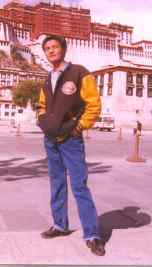
Lukar Jam‘s prison term is one of the longest-known sentences handed down to a Tibetan Political offender in the last twenty years. It is, however, part of a noticeable pattern of Tibetans who, after spending time in India for reasons of study, pilgrimage or family, are arrested and imprisoned as “spies” for the Tibetan Government-in-Exile on their return to Tibet.
Lukar Jam is a 28 year-old Tibetan from Sangnak township in Shinhai County (Chinese: Xinghai) of the Tso Lho Tibetan Autonomous Prefecture (Ch: Hainan Prefecture), Amdo (incorporated into Chinese Qinghai Province).
Lukar visited India in December 1991 where he studied for one year at a Tibetan exile school. He returned to Tibet in November 1992, allegedly carrying 14 letters for Tibetans in Amdo, four of which were delivered. In March1993, Lukar Jam was stopped by the border police in Dingri about 50 km from the border with Nepal, while making a second visit to India. The police reportedly discovered some confidential documents together with two letters addressed to the Tibetan Govermnent-in-Exile. Lukar Jam was then sent back to Qinghai to he questioned by the security police there.
From June 1994 onwards there were reports from Tibetan refugees and unofficial sources that three Amdo men had been sentenced for “espionage activities” and forming a “counter-revolutionary” group. Some sentences of up to 18 years while other sources reported much lighter sentences (See Human Rights Update, October 15, 1997). Chinese authorities withheld all details of the three cases and it was not until November 7 this year that investigations by independent monitors were able to finally confirm the sentencing.
The three Tibetans were detained in Delingha, a military base in Haixi Prefecture, and tried by the Haixi Prefecture Intermediate People’s Court in June 1994. Lukar Jam, referred to in the Chinese documents by the Chinese name Li Kexian, received eight years for ìespionageî and ten years for ìthe crime of organising and leading a counter-revolutionary groupî. His sentence was commuted to a total of 17 years according to the court-issued Criminal Judgement Document No. 19 (1994).
According to the official Chinese court documents, Lukar Jam was sentenced for collecting information and for starting a secret pro-independence group. Lukar was also aroused of planning to send abroad books about history and economics.
The other two Amdo men were Tsegon Gyal and Nam Loyak, alleged to have written the letters found in Lukar’s possession. They were reportedly detained in May 1993 and sentenced to 16 yews and 12 years respectively for writing the letters as well as allegedly “collecting confidential information” and joining Lukar Jam’s “secret group”. The sentencing of a fourth Tibetan also accused of joining the group, was not specified in the documents.
The Haixi Prosecution Service told the court that Lukar Jam and the two other men had “delivered four items of correspondence” which Lukar had brought from India and “purchased and collected over 30 volumes of books and materials, such as surveys of eight autonomous prefectures or counties of our ‘Qinghai province’ as well as eight items of ‘classified or top secret documents and data’.”
The “unlawful”, “classified” or “top secret” nature of the publication is not explained or specified in the court documents. The documents do state that the prosecution presented as evidence to the court, “one volume of statistical information about the national economy [and] one handbook of statistics about the education system”. Ironically, such county surveys and statistical information are known to be openly sold in book-shops throughout Tibet and China and are also available from specialist libraries in the West.
It is reported that authorities at the trial said Lukar was sent to Qinghai by an “external illegal organisation” to “deliver correspondence and gather intelligence” and that “on numerous occasions he disseminated reactionary opinions concerning such subjects as ‘Tibetan Independence'”.
Tibetan refugees in India say that Lukar and the other two men never accepted the Chinese allegations against them and argued that many of the books were for public sale. These arguments reportedly rejected by-the Chinese as “false and in contradiction with the law”.
Express your concern over Lukar Jam’s shocking prison tem by writing an appeal to the Chinese embassy and send it to TCHRD for forwarding.
